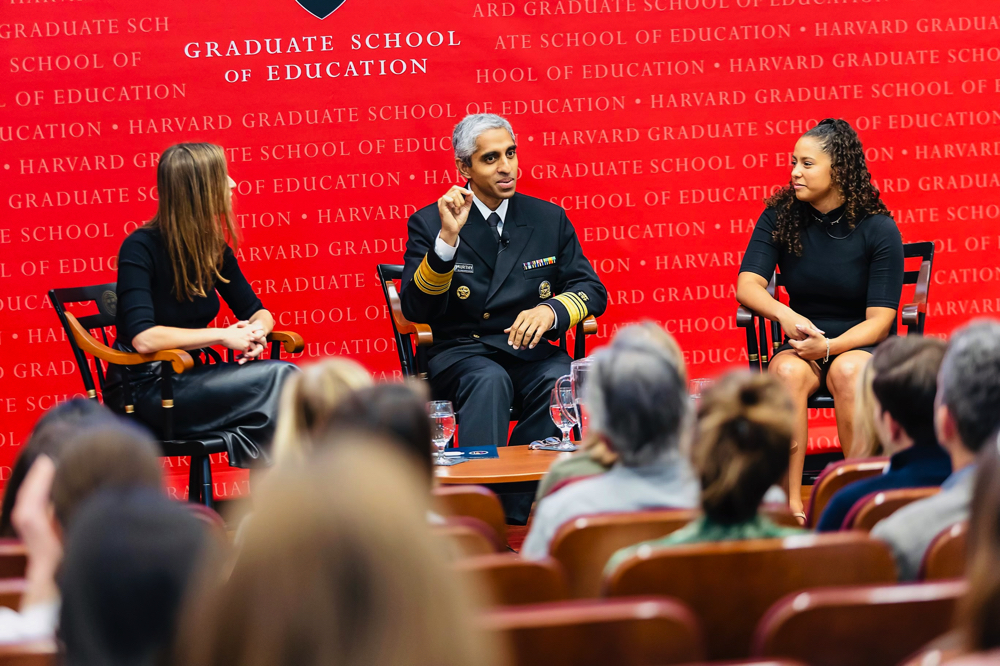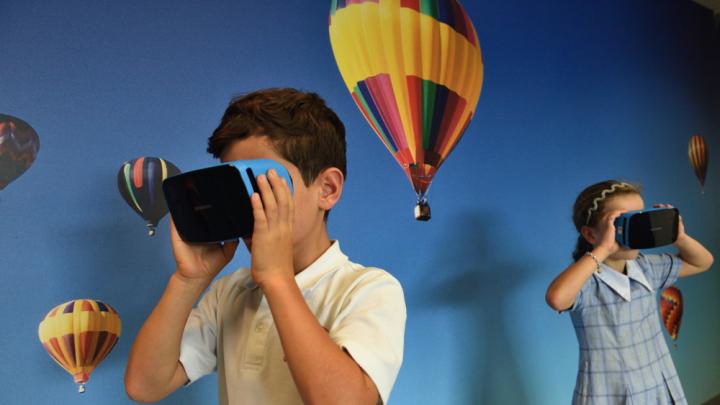When U.S. Surgeon General Vivek Murthy ’98 got his first cell phone in 2001, the ability to make calls anytime, anywhere gave him a “feeling of freedom.” Then he bought a headset. When calling someone no longer required him to hold the phone up to his ear, he could walk and talk, so spent more time chatting with faraway friends. The headset gave him paradoxical feelings of connection and isolation. He could efficiently talk on the phone, but he spent less time waving to colleagues and conversing with business and medical school classmates.
Two decades later, technology has only become easier to use. Walk around a college, and everywhere there are students with their heads down, staring at Instagram, and playing music through AirPods. Parents who grew up in an earlier technological era can struggle to help their children navigate healthy screen use. For young people, technology represents both isolation and connection. For parents, it may be an unknown space where their children can encounter dangerous ideas. On Friday, Murthy spoke at the Harvard Graduate School of Education’s Askwith Education Forum about the mental health risks of social media and provided some tools for parents to help their children develop safe practices.

During his second stint as surgeon general, Murthy has focused on mental health and recently has honed in on technology. In May, his office released a health advisory on social media’s effects on youth mental health. He acknowledged that every generation has its technological battles but argued that social media represents a paradigm-shifting threat because it has infiltrated every part of young life. When Murthy was a child, he joked, “I didn’t bring the massive television sitting in our living room…into my bed every night.”
Murthy believes the government should treat social media like any other drug: collect data, observe its benefits and side effects, and come up with regulations. He remembered how in his childhood, many people died in car crashes. Instead of declaring that vehicular deaths were “a price of modernity,” Murthy recalled, Americans said “we can both embrace new technology and modernity… We can make it safer.” Social media is not going away, so doctors, parents, legislators, and teachers must collaborate, he says, to develop proper safeguards.
For parents struggling to implement technological guidelines, Murthy offered three suggestions.
- Establish tech-free times and spaces. Periodically removing screens can help children meaningfully engage with others and learn to spend quality time by themselves.
- Lead by example. Children get annoyed when their parents are on their phones, and struggle to accept guidelines their parents don’t follow. During meals, he suggests everyone set aside their phones, and take the time to check in on each other.
- Introduce “positive forces” into the lives of your children. With his family, he enjoys playing sports, reading stories, and bringing his children to playdates.
“We can’t shield our kids entirely from the pain that’s in the world,” he said. “But we can remind them that we love them, that with us they have a secure relationship.”
Murthy argued that by design, social media seeks to isolate and anger its users. So, he challenged the audience to restore digital humanity. When someone calls at an inconvenient moment, Murthy suggests that instead of rejecting the call and texting “I’m busy,” people should accept the call and say they can’t talk. “It takes the same amount of time,” he said, “but you hearing their voice…makes a huge difference in how you feel.” Similarly, he wants to revive voicemail, which young people often ignore. He believes a sonic message is more meaningful than a text.
When children encounter troubling situations on social media, it can feel to them like the end of the world. For some, it is: Murthy recently visited parents whose children committed suicide after being cyberbullied. He therefore wants to help parents and educators teach their children that the internet does not represent real life. That way, children can have a robust, healthy life that exists outside of their phones. “We want a world in which our kids aren’t judged for every mistake they make,” he concluded. “Where they’re not condemned because they had a bad moment, or because they used the wrong word. Where their intention actually matters. And if they do mess up, that someone will give them the benefit of the doubt, will extend a hand to lift them up and help them get on their way. And we want them to do the same thing for other people.”








